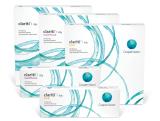Ah, spring!
It’s a time of April showers and May flowers. And for many of us, the return of seasonal allergies and burning, itchy red eyes.
If this scenario is instantly relatable to you, you’re not alone. Eye allergies are very common.
What can you do to help eye allergies? Plenty.
Watery eyes, allergy eyes, itching…oh my!
Eye allergy symptoms can appear at any time of the year. This can depend upon your location and type of allergy: Seasonal, usually plaguing us for half the year, and perennial, which stay with us year round.
An eye allergy can be caused by many outside elements. Seasonal allergies are brought about by allergens carried in the air outside, such as pollen, ragweed, grass, etc. Perennial allergies have different perpetrators, from pet dander to dust mites.
One important note: If you’re experiencing itchy eyes and other allergy symptoms, it’s a good idea to see your doctor for a professional diagnosis. It could be something else with allergy like conditions, such as a style, which is a swollen gland on your eyelid, or even pink eye, a highly contagious infection. (Read more about it here.)
Treatment for eye allergies
Aside from prescribed medication, there are natural home remedies for allergies that you can try for some relief.
Start with avoiding the cause (if possible). It may sound obvious, but a little planning can pay off in no-sneezing, allergen-relief dividends later.
If you have a seasonal allergy, try to avoid outdoor activities during windy days in the spring and summer. A spring shower can do wonders with pollen, so try to reserve any landscaping jobs for a day after rainfall.
You may also want to consider leaving your shoes outside, so you don’t track in pollen throughout your home.
More antihistamine-free ideas for allergies
While hanging your sheets and pillowcases out to dry can be great for the environment (and your electricity bill), you might want to consider using your electric dryer on days when the pollen count is high. Otherwise, you risk a night of sneezing and watery eyes as you lie on contaminated material.
Try to resist rubbing your itchy eyes with your hands. This can make matters worse with eye allergies.
Washing your face and splashing the water away from your eyes can also help wash away pollen and other potential irritants. Clean your hands first with soap, and then wash your face without it. The soap can irritate your eyes as well.
All of us are different. As always, be sure to consult your physician for the eye allergy treatment that best suits you.
Contact lenses and allergies
If you wear contacts and suffer from allergies, you’ve probably experienced days when you wanted to stay in the shower for hours and hours. We can relate. But before you skip work or your classes, there are some steps you can take to alleviate your eye itchiness and redness.
Clean your contacts and follow the manufacturer’s recommended wear schedule. Try not to forget this important step! Write yourself a note. Create a reminder as an email or text.
Keep your rewetting drops handy. This is always a good idea, but pretty much mandatory on pollen-heavy days.
If possible, consider switching to daily contact lenses instead of two-week or monthly contacts. This can help reduce any allergy contaminants in your eyes.
Eye allergies are no fun. But there are steps we can take to help make things better. Ask your eye doctor or family MD at your next appointment for the right steps for you.
Nothing in this article is to be construed as medical advice, nor is it intended to replace the recommendations of a medical professional. For specific questions, please see your eye care practitioner.






